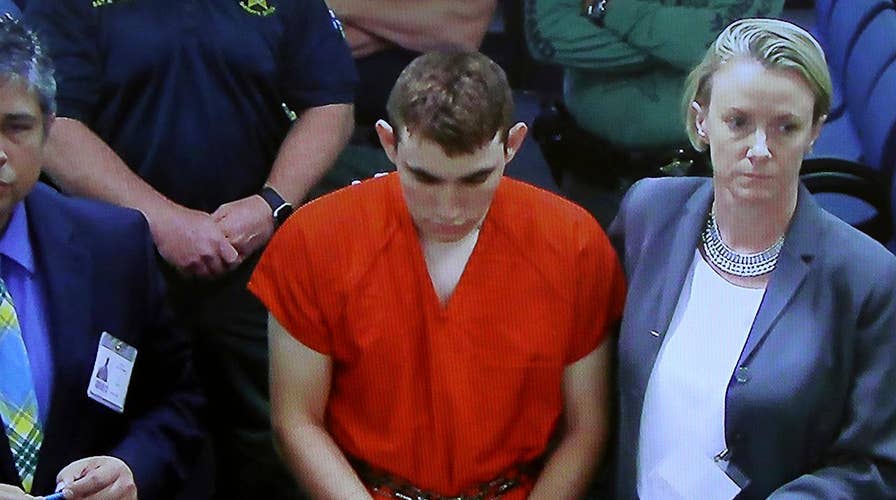Why so many missed warning signs in the Florida shooting?
Questions emerge over whether officials missed warning signs about Nikolas Cruz; reaction on 'Journal Editorial Report.'
Following the Wednesday shooting at a Florida high school that took 17 lives, gun control activists and Second Amendment advocates are predictably arguing about the causes of such horrible violence and what to do next. We should not overlook the big role that social media companies play.
Nikolas Cruz – the 19-year-old who has confessed to the shooting at Marjory Stoneman Douglas High School in Parkland, Florida – posted disturbing material on social media before his attack, authorities said. His posts reportedly included discussing his desire to kill someone, along with hateful messages threatening violence against African-Americans, Jews and gay people, according to media reports.
Cruz’s activity on social media is not an isolated case. The lack of accountability on social media platforms for the content they carry and make available to millions of people around the world has contributed to terrorism, mass murders, child sex trafficking, targeted attacks on police officers, manipulation of elections and online violent exhibitionism.
Facebook, Google and Twitter argue that they should have no responsibility for the content posted on their platforms – in the same way telephone companies have been ruled not responsible for what people say on calls. If, for example, one person calls another and makes a death threat, the phone company is not held responsible.
But social media companies are different – text, photos and videos on their sites can be viewed by millions of people around the world – unlike a phone call that involves just two people or a small group.
Because social media have played a significant role in recent attacks that threaten our homeland security interests, it is now time for Congress to act and regulate social media companies.
Consequently, social media companies should not be above the law and should be subject to reasonable federal regulation, in the same way radio and TV stations are regulated.
The high school shooting in Florida – like many other school shootings – highlights the fact that most shooters displayed signs of mental illness and were either radicalized to carry out their attacks or announced their intentions via social media.
Yet time after time, the social media companies fail to warn law enforcement and do not restrict the threatening content that led up to the shootings.
As a doctor of education and a law enforcement professional, one of us (Demetrick Pennie) has studied the prevalence of emergent extremist groups in America and how their influence has been amplified in recent years by social media.
Online social media platforms such as Facebook, Google (which owns YouTube) and Twitter have become a catalyst for the rise in radicalized attacks across this country. These platforms have provided the ability for terrorists to connect with individuals who suffer from an inability to separate fanatic ideas from reality.
Considering that 1 in 5 Americans suffer from some level of mental illness, it would be difficult for anyone to monitor and intervene in problematic behaviors that could lead to violence.
However, because social media have played a significant role in recent attacks that threaten our homeland security interests, it is now time for Congress to act and regulate social media companies.
Over the past four years, social media companies have been permitted to mismanage their platforms. This has allowed terrorists and others with extremist views to freely distribute radicalized propaganda.
Recently, Facebook, Google and Twitter executives have claimed protection for their companies under the First Amendment to the Constitution when critics have called for them to be subject to civil lawsuits or criminal prosecution because of dangerous material people posted on their platforms.
Currently, the companies enjoy protection under the 1996 Communications Decency Act (CDA), which states that online service providers are immune from civil liability for illicit third-party content published on their platforms.
However, based on factual disclosures revealed in congressional hearings, the social media companies should not be eligible for CDA protection because they create, distribute and share profits earned from radicalized content.
We can argue endlessly about what level of gun control is appropriate, and about actions that law enforcement, school officials and others should be taking to protect us from attacks at schools and elsewhere in our country. These are important issues we must address.
At the same time, we should stop ignoring the fact that social media continue to be a contributing factor in many of these attacks. It is now time for society and our government leaders to focus on nipping looming threats of violence in the bud.
To do this, we need to force social media companies to use appropriate technologies and skills to minimize the amount of dangerous content on their platforms.
For America to truly be a nation of laws, our justice system must ensure that the rule of law is equally applied to all – including rich and powerful businesses. It is now time for the law-abiding citizens in this nation to stand up to the social media companies and say: Enough is enough!





















